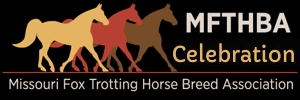Attendees Reminded of Equine Check in Process
All horses entering the MFTHBA showgrounds must have a negative Coggins test within the past 12 months and a Certificate of Veterinary Inspection (within the last 30 days), regardless of state of origin.
Horses must enter through the equine entry gate to have paperwork checked. There is a $10 per horse inspection fee. The equine entry gate will be staffed starting Friday, September 1st.
Equine Entry Gate Hours:
Friday, September 1 and Saturday, September 2: 8:30 a.m. to 10 p.m
Sunday, September 3- Saturday September 9: 8 a.m. to 6:30 p.m.
For horses arriving earlier than Friday or outside equine entry gate hours, a member of the MFTHBA Board of Directors will be available Friday, September 1 through Saturday, September 2 to check in horses at their stalls. This will occur between 11 a.m. and 1 p.m. each day. To have horses checked during this time, owners must sign up in the MFTHBA office.
After Sunday, any horse entering outside the equine entry gate hours, must bring their horses to the gate to be checked promptly after the gate reopens.
Don’t forget about biosecurity!
With the World Show and Celebration just a few weeks away, the MFTHBA encourages all exhibitors to keep their horse’s health and the health of other equine competitors in mind.
The MFTHBA requires all horses entering the MFTHBA World Headquarters have a current Certificate of Veterinary Inspection (within the last 30 days) and negative Coggins test. While not required, the board recommends that exhibitors work with the veterinarian to determine appropriate booster vaccinations needed prior to attending the show.
The MFTHBA also recommends that exhibitors practice good biosecurity prior to, during, and following the event. Below are some suggestions for preventing disease in your horses. These recommendations were adapted from the United States Department of Agriculture brochure “Biosecurity—The Key to Keeping your Horse’s Health.”
At the show or trail ride:
- Don’t share equipment (e.g. buckets, brushes, etc.) with other horses. Diseases, fungus, and bacteria can be spread through shared equipment.
- Wash your hands, especially after you help other people with their horses.
- When you arrive at the show grounds or trail riding facility, clean and disinfect the stalls you will be using. This is especially important in locations where another horse recently occupied the stalls.
- When you arrive home, shower and put on clean clothes and shoes before going near your other horses. Clothing can carry disease from one location to the next.
Visiting farms, horse shows and auctions:
- Have a pair of boots or shoes that you save for visiting. These shoes or boots should not be worn around your own horses. Plastic boot covers are another option. Manure and soil collected on your boots can carry disease from one location to the next.
- Change clothes when you arrive home, prior to working with your own animals.
Bringing a horse home from a show or trail ride:
- If even one of your horses travels, all of your horses need to be vaccinated. Horses can bring disease home with them to your operation. Work with your local veterinarian to determine an appropriate vaccination program. Be sure to tell the veterinarian where you plan to travel as different areas of the country have different disease concerns.
- When you return from a trip with your horses, isolate the horse from the rest of your herd for at least 2 weeks. Returning horses should not be allowed to have nose-to-nose contact with other horses.
- Work, feed, and care for quarantine horses last to prevent spreading diseases among your herd.
- Don’t share equipment (e.g. buckets, brushes, etc.) with other horses. Diseases, fungus and bacteria can be spread through shared equipment.
- Wash your hands and change your clothes after you work with quarantined horses.
- Exhibitors are encouraged to work with their local veterinarian to determine other ways they can prevent the spread of disease.
